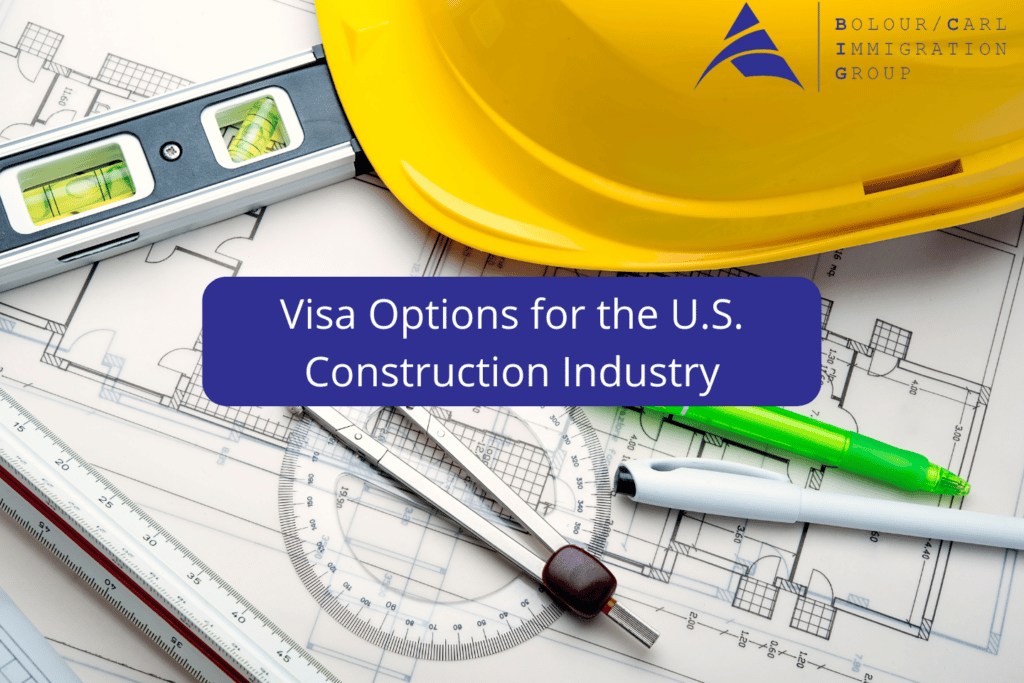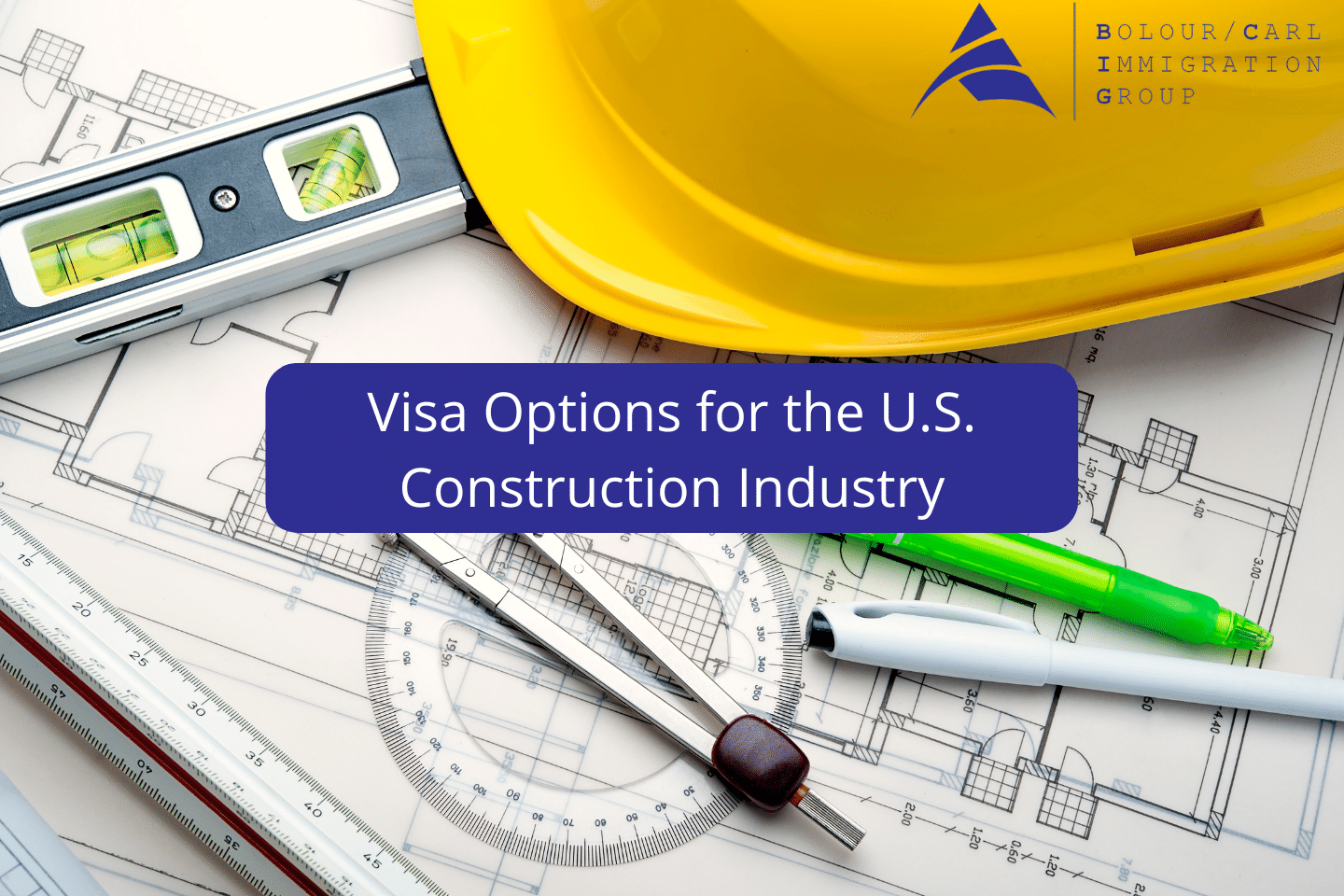
The U.S. construction industry is facing a growing labor shortage. In its 2022 Construction Outlook, Associated General Contractors reported that 83 percent of contractors nationwide are having a hard time filling some or all of their open positions. U.S. construction companies who struggle to fully staff their operations can hire foreign nationals through several visa programs. The options available will depend on the position, the skill level it requires, and the worker’s qualifications and country of origin.
H-2B Visa Program
The H-2B visa program allows U.S. employers to hire foreign nationals from about 80 eligible countries to fill seasonal and other temporary positions that require little or no formal education.
With labor shortages plaguing the construction industry for the last decade and more, construction is among the industries with the highest prevalence of H-2B workers, along with food service, hospitality, amusement, janitorial services and landscaping.
To successfully hire foreign workers through this program, employers must be able to demonstrate that the work is in fact temporary. They must also secure a temporary labor certificate by showing that they tried but failed to recruit U.S. workers to fill the position and that hiring foreign laborers will not harm similarly situated U.S. workers.
Unfortunately, demand for the H-2B program exceeds the number of visas available each year, and spots are awarded by lottery. In a typical year, H-2B visas are limited to 66,000 in total, with half reserved for workers with job start dates from October 1-March 31 and the other half allotted to workers beginning work from April 1-September 30.
An H-2B visa can be approved for up to a year initially, and it can be extended in one-year increments, not to exceed three years total.
H-1B Visa Program
For positions requiring specialized knowledge and education, such as project manager, architect or engineer, the H-1B visa program for specialty occupations may apply.
To qualify as a specialty occupation, the position must normally require at least a U.S. bachelor’s degree or the foreign equivalent, and the foreign worker must hold a bachelor’s degree or its equivalent in a field related to the position.
Similar to H-2B visas, U.S. employers must show they were unable to recruit workers domestically or that hiring a foreign worker will not harm similarly employed U.S. workers.
Another similarity is that H-1B visas are capped. In a typical year, 85,000 visas are given out, with 20,000 spots reserved for advanced degree professionals who graduated from a U.S. university. As demand for H-1B visas can exceed 200,000 applications, the program is highly competitive.
H-1B visas are valid for an initial period of up to three years, and they can be extended for up to three additional years.
TN Visa Program
Under the special economic relationship created by the North American Free Trade Agreement, Canadian and Mexican citizens in certain professions can apply for TN nonimmigrant status if they have a job offer from a U.S. employer. The list of TN visa-eligible positions includes some occupations that construction companies may hire for, including architect, engineer, industrial designer and landscape architect.
TN nonimmigrant visas are valid for up to three years initially and can be extended, with no set limit to how long an individual can stay in the TN status.
TN visas are not capped and the application process is not as arduous as other employment-based visa programs.
Employment-Based Green Cards
Construction companies may choose to sponsor certain noncitizen workers for employment-based green cards. These immigrant visas are divided by “preference” categories, with the third preference (EB-3) the most appropriate choice for most construction positions. The EB-3 category applies to skilled workers, professionals and other workers with a full-time, non-seasonal job offer.
However, EB-3 visas are limited each year and the process can be very lengthy. After employers secure permanent labor certification for the position from the Department of Labor and petition on behalf of the prospective employee with U.S. Citizenship and Immigration Services, EB-3 visa applicants are assigned a priority number. Their visa application cannot be processed until their priority number comes up. Priority numbers vary by country, and for visa applicants from certain countries, the wait can stretch on for several years.
Bolour/Carl Can Help
Whether you are a construction company looking to hire foreign national workers or a foreign national worker with a job offer from a U.S. employer, the employment-based visa lawyers at Bolour/Carl can help you determine the best visa program to meet your needs and expertly guide you through the complex H-2B, H-1B, TN or green card application processes. Contact Bolour/Carl Immigration Group at 323-857-0034 or [email protected].
5 Steps To Prepare For Your Visa Interview
Getting a job in the US is an exciting opportunity, and your employment-based visa lawyers can help you with the transition. At Bolour / Carl Immigration Group, APC, we’ve helped thousands of clients with our over 25 years of legal experience. Whether it’s an employment visa or permanent residency, we’re ready to walk you through your next steps. Read on to see how you can get prepared for your visa interview.
1. Review Your Application And Supporting Documents
First, you should familiarize yourself with every detail of your visa application and the supporting documents you have submitted. Understand the relevance of each document and how it supports your case. Be prepared to discuss any aspect of your application or any document you have provided, such as proof of financial stability, job offers, or ties to your home country. Your employment-based visa lawyer can walk you through the required paperwork.
2. Practice Answers To Common Questions
While every visa interview is unique, some questions are quite common, such as explaining the purpose of your visit, your plans after the visa expires, and how you plan to support yourself while in the U.S. Practicing your answers to these questions can help you articulate clearly and confidently. You might consider conducting mock interviews with a friend or family member. Remember, the key is to be honest and consistent in your responses.
3. Understand The Role Of The Interview
Knowing the purpose of the visa interview can significantly ease your anxiety. The primary goal of the interview is to verify the information provided in your application and to ensure that you meet all the criteria for the visa category for which you are applying. The consular officer also assesses whether you pose any security or legal risks. Understanding this can help you stay focused on providing clear and concise answers relevant to the questions asked.
4. Prepare Your Attire And Presentation
It is essential to make a good first impression. Dressing appropriately in business attire shows that you take the interview process seriously and respect the formal nature of the occasion. Ensure your appearance is neat and professional. Moreover, practice good posture, maintain eye contact, and offer a polite greeting and farewell. These non-verbal cues can be just as important as your verbal responses.
5. Plan Your Interview Day
Plan the logistics of your interview day in advance. Know the location of the embassy or consulate and the time it takes to get there. Arrive early to accommodate any unforeseen delays and to allow yourself time to relax and compose yourself before the interview begins. Bring a folder containing all necessary documents organized in the order you might need them, including extra copies of your photo and forms.
Contact Us Today
If you need personalized assistance or have specific concerns about your upcoming visa interview, don’t hesitate to reach out to us. At Bolour / Carl Immigration Group, APC, we’re here to help you with tailored advice and support to make your visa application process as smooth as possible. Contact us today, and see how an employment-based visa lawyer from our office can help.


